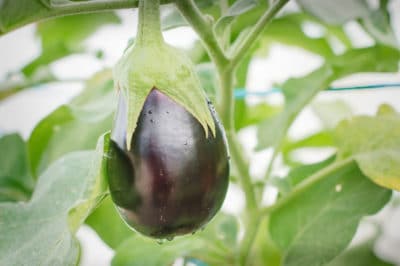Diagnose the Problem
In order to help your eggplants start growing again, you have to figure out the problem. Depending on the symptoms, you can use effective remedies to solve the problems of your eggplants growth.
Pests
Many garden pests love to munch on eggplants, causing various growth problems.
Grubs and cutworms chew off seedlings at ground level. Push a plastic or cardboard collar around the stem, one inch into the soil to prevent stem damage.
- Aphids cause deformed, stunted eggplants. They gather on the underside of the foliage, leaving excrement behind that causes mold growth. Spraying the plants with water helps wash off these insects, which include ladybugs, flies and praying mantis.
- Whiteflies weaken eggplants by sucking the moisture out of the leaves. Spraying the foliage with an organic insecticidal soap can help eliminate the flies.
- Flea beetles chew the eggplant leaves, causing tiny, shotgun holes. This damage prevents eggplant seedlings from growing. Frequent weeding and planting companion plants that repel flea beetles helps solve this problem.
Soil Condition
Eggplants need well-drained soil, rich in nitrogen and phosphorous for optimal growth. If your soil lacks any of these conditions, your eggplants will grow foliage, but not bear any fruit. Spread compost or manure in your garden to add nutrients to the soil.
Temperature
If the temperature rises above 90°F (32°C), the leaves on your eggplants could roll downward. Plant growth also stops due to extreme heat. If this is the case, water your eggplants regularly, making sure the water reaches deep into the soil. On the other hand, if the temperature is too cool for your eggplants, usually below 65°F (18°C), the flowers will fall off, and you won’t get any fruit. Cool weather also stunts the growth of eggplants.
Sunlight
Lack of sunlight causes stunted growth in eggplants. They need full sun, all day long. If your garden doesn’t provide full sun, consider planting eggplant in containers that you can move into sunny areas.
Pollination
Every eggplant flower has male and female organs that self-pollinate to produce the fruit. Bees and wind help the flowers to transfer the pollen from the male to the female. If you’re eggplants aren’t growing, you can help pollinate the flowers by tapping on the plants to spread the pollen. You can also use a paintbrush to aid in pollination.
Once your eggplants have the correct growing conditions, including moist, nutrient-rich soil, temperatures of 70°F (21°C) to 85°F (29°C), and companion plants that repel pests, your garden should produce plenty of tender, well-formed eggplants.












